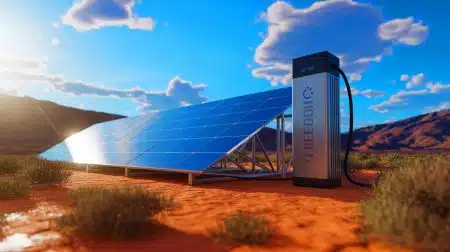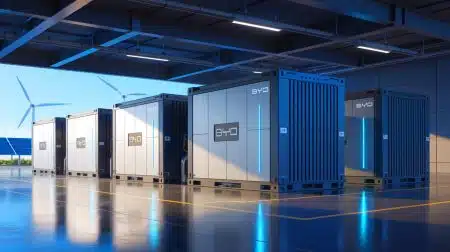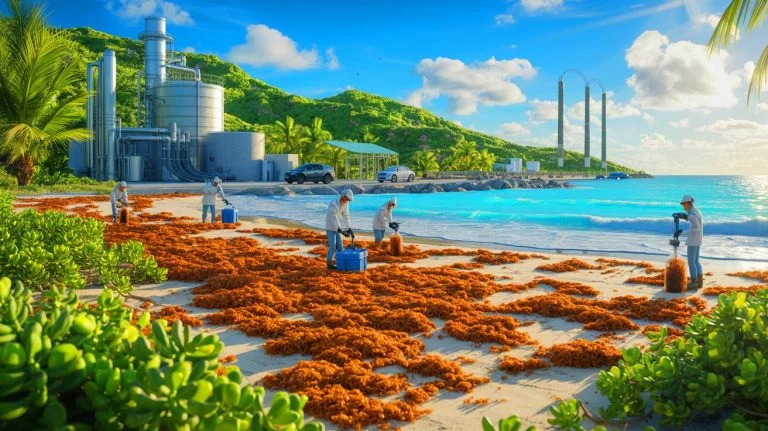| IN A NUTSHELL |
|
The idyllic beaches of the Caribbean, known for their pristine beauty, are facing an unprecedented invasion. Brown, muddy algae have taken over the shorelines, posing significant challenges for local tourism. The situation has escalated to the point where Barbados’ Prime Minister, Mia Mottley, declared it a national emergency. However, amid this ecological crisis, scientists see a silver lining. They propose that these invasive algae could be harnessed as a lucrative source of biogas, potentially revolutionizing energy sources for vehicles. This innovative approach could not only mitigate the environmental impact but also offer a sustainable energy solution.
Transforming Algae Into a Fuel Source
Scientists at the University of the West Indies (UWI) in Barbados have been at the forefront of research into converting algae into a viable fuel. They have developed a conversion kit capable of transforming conventional gasoline-powered cars into vehicles running on algae-based products. The estimated cost for this conversion is approximately $2,600, making it a relatively affordable alternative for many car owners.
Legena Henry, a professor at UWI and an expert in renewable energy, emphasizes the dual benefits of this innovation. Not only does it provide a new energy source, but it also helps address the pressing issue of algae proliferation. The tourism industry, heavily impacted by the algae, stands to benefit significantly if the tide can be turned in favor of this renewable energy solution.
The Science Behind the Transformation
The process developed by the UWI team involves combining algae with wastewater from a local rum distillery in a bioreactor. This combination has been found to produce substantial amounts of usable biogas. Brittney McKenzie, a UWI student involved in the project, noted that the results exceeded initial expectations within just two weeks of experimentation.
The innovative use of algae not only provides an alternative fuel source but also enhances the sustainability of local industries. By converting waste products into energy, the project showcases a closed-loop system that could serve as a model for other regions facing similar environmental challenges.
Protecting Tourism and the Environment
The tourism sector in Barbados has suffered greatly due to the algae invasion, with hotels spending millions to manage the problem. By converting algae into fuel, the negative impact on tourism could be significantly reduced. Shamika Spencer, a biologist involved in the project, highlights the importance of this approach. The re-use of algae in vehicles not only protects the tourism industry but also prevents harmful inhalation by residents and tourists alike.
As the project progresses, scaling up to fuel more vehicles will require substantial volumes of algae. However, the potential benefits for the environment and the economy are substantial. If successful, this could pave the way for similar initiatives in other regions affected by invasive species.
Prototypes and Future Prospects
Currently, the UWI team is implementing a pilot project involving four cars to demonstrate functional prototypes. The aim is to showcase the feasibility and scalability of the algae-based fuel solution to potential investors. Legena Henry believes that proving real-world application is crucial for securing the necessary funding to expand the project.
By demonstrating the practicality of this innovative fuel source, the team hopes to attract interest from global investors and environmental organizations. The ultimate goal is to create a sustainable energy model that can be replicated worldwide, addressing both environmental challenges and energy demands.
The Caribbean’s algae invasion has prompted scientific ingenuity that could redefine renewable energy strategies. The success of this project could offer a blueprint for other regions facing similar ecological challenges. As the world grapples with climate change and energy sustainability, could algae-based biogas be a key part of the solution?
Did you like it? 4.3/5 (25)






Wow, turning a problem into a solution! 🍃 Hope it works out.
Is this algae fuel safe for all types of vehicles? 🤔
Sounds like a great idea, but how realistic is it to replace fossil fuels entirely?
Why hasn’t this been done sooner if it’s so promising?
How does the cost of algae fuel compare to traditional gasoline?
Hope this means cleaner beaches soon. 🌊
Did anyone test the long-term effects of algae fuel on car engines?
Thank you for sharing this. It’s good to see innovative solutions to environmental problems.
How large an area do you need to harvest enough algae for fuel?